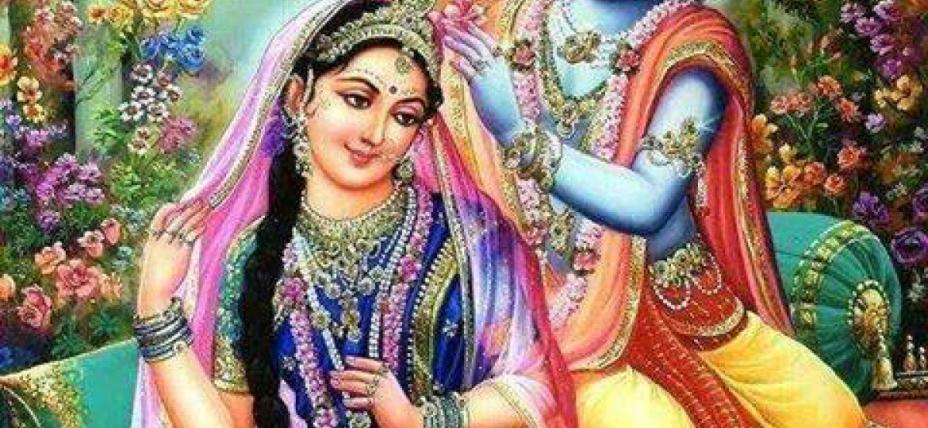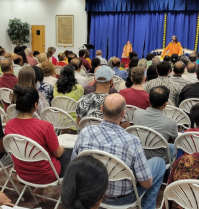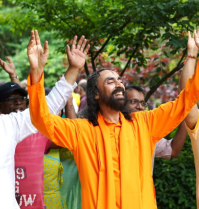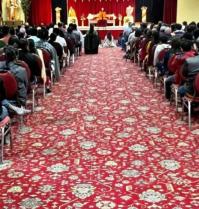Highest Sacrifice is Self-Happiness
Bhakti Yog / July 07, 2017

The Vedic scriptures inform us that we are eternal servants of God. 500 years ago Chaitanya Mahaprabhu said the same thing:
jīver svaroop hay kṛiṣhṇer nitya dās
meaning, we are the eternal servants of Shree Krishna. But what does it mean to be a servant and to serve Krishna? As a servant, it means that we should serve the Master on his terms, according to his wishes. If he says, “Get me a cup of tea” in the middle of the night, we do so without complaining and without any grudges.
Shree Kripaluji Maharaj, in his pada, Sadhana Karu Pyare, said:
unkāsukh hī chahuṁ niśhi din, sukh na nij chahu pyāre
unakī ichchhā meṁ hī apanī, rākhu ichchhā pyāre
emphasizing the need to align our happiness in His happiness and to not desire our happiness.
Harbor positive sentiments towards God
Understand that there are two aspects to loving God and Guru. The first is to harbor loving sentiments towards Guru and God at all times. After all, if God reciprocates all our sentiments as He always does, we don’t want Him reciprocating the negative sentiments towards us! Additionally, negative sentiments pave the way for the soul to keep rotating through the 8.4 million species of life which does not help us get to our goal of selfless love.
Be ready to make sacrifices for Him
Second is the concept of sacrifice. Rupa Goswami, one of the disciples of Chaitanya Mahaprabhu said:
bhuktimuktispṛihā yāvat piśhāchī hṛidi vartate
tāvat bhaktisukhasyātra kathamabhyudayo bhavet
meaning, “So long as the two witches in the form of bhukti and mukti reside in the heart of an individual soul, the Supreme Goddess of Devotion cannot manifest herself.” This is because the root cause of both bhukti and mukti is the desire for self-happiness as explained below. So our ultimate goal is the sacrifice of this desire; it should be replaced with the desire for Guru and God’s happiness alone.
Sacrifice the desire for Bhukti or material pleasures
Bhukti is the desire to enjoy material energy via the five senses: eyes (sight), ears (hear), nose (smell), tongue (taste), and skin (touch). In other words, we like to see beautiful things, hear nice words especially about ourselves, smell good food or fragrances, taste well cooked food or sweets, and hug our friends and family. All these symptoms are manifestations of our desire for self-happiness.
We all have heard the story of when God granted darshan to Indra, and promised him a boon. As the king of the celestial gods, Indra has all the material riches we typically hanker for—wealth, fame, and power—that extend beyond our imagination. And yet, instead of asking for divine love or eternal service, Indra asked for a woman, indicating the desire for material happiness (bhukti) is insatiable. This desire for material happiness is not limited to the pleasures of the earth planet—it extends to all the seven layers of heaven as well—all the way up to Bhramalok. In other words, the desire for our happiness exists in the entire realm that Maya rules.
Sacrifice the desire for Mukti or liberation
But what happens beyond that i.e. in the divine realm of Krishna that is beyond Maya? To understand this, let’s start by understanding the concept of mukti.
Mukti is the desire for liberation. In other words, freedom from the pain or sorrow we experience during our sojourn on earth. But this freedom or liberation that we are seeking is also for our happiness! Since the search for happiness stems from selfishness, its definition keeps on changing and it takes on different forms. However, deeply embedded within us is the knowledge that true happiness lies only in Krishna. So now this selfish desire for liberation becomes redirected towards Krishna in five subtle ways as follows:
Sālokya mukti is the desire to live in God’s abodes
Sārṣhṭi mukti is the desire have the same opulence, wealth, and fame as God
Sārūpya mukti is the desire to have the same form as God
Sāmīpya mukti is the desire to be close to God as his personal aide
And the worst of them all, also considered the queen by the jñānīs, is called sāyujya or kaivalya mukti. This is where we desire to become one with Krishna by merging into Him. When that happens, we eternally lose the opportunity to serve our Lord. What a waste!
This why a wise devotee will always stay away from liberation. If the desire for any form of liberation enters the heart, it becomes all the more difficult to make the requisite sacrifice due to the immense pleasure (selfish happiness) received from being so close to Krishna.
As we can see the desire for our happiness is insatiable. It can be likened to a fire that keeps burning and never dies. It may simmer down in one direction but will come back strong again and again and again. There is no end to these desires for our happiness and it is precisely this sacrifice that ShyamSundar is seeking before granting us divine, eternal bliss. Such was the love of the gopis of Braj so much so that even though Mathura was only two hours away from Vrindavan, they did not go to see their beloved Krishna. Instead, they bore the pain of separation patiently for a hundred years until He came back to see them.
The good news is that these selfish desires, including the desires for happiness and liberation, once redirected in the happiness and service of God and Guru will lead us to eternal love. Thus, we should make it our goal to serve God and Guru for their happiness alone.

























